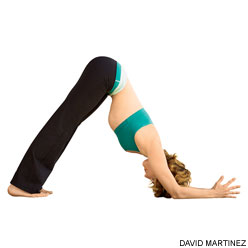Pose for the week
Dolphin Pose
Step by Step
Come onto the floor on your hands and knees. Set your knees directly below your hips and your forearms on the floor with your shoulders directly above your wrists. Firmly press your palms together and your forearms into the floor.
Curl your toes under, then exhale and lift your knees away from the floor. At first keep the knees slightly bent and the heels lifted away from the floor. Lengthen your tailbone away from the back of your pelvis and press it lightly toward the pubis. Against this resistance, lift the sitting bones toward the ceiling, and from your inner ankles draw the inner legs up into the groins.
Continue to press the forearms actively into the floor. Firm your shoulder blades against your back, then widen them away from the spine and draw them toward the tailbone. Hold your head between the upper arms; don’t let it hang or press heavily against the floor.
You can straighten your knees if you like, but if your upper back rounds it’s best to keep them bent. Continue to lengthen your tailbone away from the pelvis and lift the top of your sternum away from the floor.
Stay between 30 seconds to one minute. Then release your knees to the floor with an exhale.
Thoughts
 September 20, 2012
September 20, 2012
“Real beauty is not about weight or symmetry or makeup. It’s about looking life right in the face and seeing all of its magnificence reflected in your own self.”
— Valerie Monroe
Pose for the week
Feathered Peacock Pose
Pincha Mayurasana
(pin-cha my-your-AHS-anna) piñca = feather
mayura = peacock
Step by Step
Perform a modified Adho Muhka Svanasana at your yoga wall, with your palms and forearms on the floor. Your fingertips should be right at the base of the wall, and your forearms parallel to each other at shoulder width. This pose isn’t quite as scary as Adho Mukha Vrksasana; it has a firmer base of support, and the head isn’t as far away from the floor. But it can still be somewhat intimidating. To ready yourself for and secure yourself in this inversion, firm your shoulder blades against your back torso and pull them toward your tailbone. Then rotate your upper arms outward, to keep the shoulder blades broad, and hug your forearms inward. Finally spread your palms and press your inner wrists firmly against the floor.
Now bend one knee and step the foot in, closer to the wall (let’s say the left leg), but keep the other (i.e. right) leg active by extending through the heel. Then take a few practice hops before you try to launch yourself upside down. Sweep your right leg through a wide arc toward the wall and kick your left foot off the floor, immediately pushing through the heel to straighten the leg. Hop up and down like this several times, each time pushing off the floor a little higher. Exhale deeply each time you hop.
Hopping up and down like this may be all you can manage for now. Regularly practice your strength poses, like Adho Mukha Svanasana (or the modified version that’s the beginning position here), Plank Pose, and Chaturanga Dandasana. Eventually you’ll be able to kick all the way into the pose. At first your heels may crash into the wall, but again with more practice you’ll be able to swing your heels up lightly to the wall.
If your armpits and groins are tight, your lower back may be deeply arched. To lengthen it, draw your front ribs into your torso, reach your tailbone toward your heels, and slide your heels higher up the wall. Draw the navel toward the spine. Squeeze the outer legs together and roll the thighs in. In Pincha Mayurasana your head should be off the floor; hang it from a spot between your shoulder blades and gaze out into the center of the room.
Stay in the pose 10 to 15 seconds. Gradually work your way up to 1 minute. When you come down, be sure not to sink onto the shoulders. Keep your shoulder blades lifted and broad, and take one foot down at a time with an exhalation. Lift into Adho Mukha Svanasana for 30 seconds to a minute. We tend to kick up with the same leg all the time: be sure to alternate your kicking leg, one day right, next day left.
Artist for the week
Thought for the week
“Imagination is more important than knowledge. Knowledge is limited, where as imagination embraces the entire world stimulating progress, giving birth to evolution.”
-Albert Einstein
Book for the week
Aristotle – Works
Poem for the week
There is another sky by Emily Dickinson
There is another sky,
Ever serene and fair,
And there is another sunshine,
Though it be darkness there;
Never mind faded forests, Austin,
Never mind silent fields –
Here is a little forest,
Whose leaf is ever green;
Here is a brighter garden,
Where not a frost has been;
In its unfading flowers
I hear the bright bee hum:
Prithee, my brother,
Into my garden come!
Quote
The door to a balanced success opens widest on the hinges of hope and encouragement. ~Zig Ziglar
Labor Day, Labor Daily
By Lee Colan, Ph.D.
As I was cleaning off my outdoor grill after a traditional Labor Day family barbeque, I reflected on why Labor Day was, well, Labor Day. I love living during a time when any answer is just a Google and a click away.
Labor Day has been celebrated on the first Monday in September in the United States since the 1880s. The form for the celebration of Labor Day was outlined in the first proposal of the holiday—a street parade to exhibit to the public “the strength and esprit de corps of the trade and labor organizations,†followed by a festival for the workers and their families. This became the pattern for Labor Day celebrations.
Okay, simple enough—a celebration of workers. Although the trade and labor organizations have morphed over the years, we are all workers. Whether we clock in and out, manage a team, run a business or invest in many businesses—they are all forms of work. The Depression era yielded a generation who had a black and white view of work—work until you are 62 years old, then retire. There was no grey.
Many of today’s workers search for careers they are passionate about. The result: work does not feel like work. They can labor daily and see it as a blessing, a way of expressing their gifts, and yes, of course, a way of earning a living. We each have a need for mastery and meaning—to do something well and to contribute to something bigger than ourselves.
Working in Your Sweet Spot
Most types of sports equipment—a golf club, a tennis racquet, a baseball bat—have a certain spot that, if the ball hits it, will give the player the optimal result. Hitting this sweet spot yields a long drive down the fairway, a swift crosscourt return or home run swing. Every sport has a sweet spot of some type. If you have experienced it, you know when you hit the sweet spot, you barely feel it. The ball goes where you want it to go… even further and faster. Doesn’t get any better than that!
Did you know the average person possesses between 500 and 700 different skills and abilities? If we are going to labor daily (and be excited about it), our goal is to find that skill or ability that’s right in our sweet spot. When we do, we will be in “the zone†and our work will feel like play.
Want to know an easy way to find your professional sweet spot? Look at the intersection of these two questions:
What am I absolutely passionate about?
Which tasks are very easy and natural for me to perform?
Most of us vividly remember the moment we found our professional sweet spot. Others told us we made it look easy, that we really excelled and we looked like we were having a ball. Think of the last time when others made these comments to you. What were you doing? Like finding any sweet spot, it’s worth hitting these questions around for awhile and practicing our answers before we can serve up a winner.
Ralph V. Gilles understands this process. He dropped out of college and was spending most of his time—by his own admission—slacking in his parents’ basement, eating granola, watching “Dukes of Hazard†reruns and lamenting the sorry state of automobiles being made in America.
Growing up, Gilles was typical of most boys who played with Hot Wheels and Formula 1 model cars. But, as a teenager, he also was extremely talented in sketching vehicles. In fact, his aunt wrote a letter to then Chrysler Chairman Lee Iacocca, saying he should hire her 14-year-old nephew.
A Chrysler executive responded, recommending three design schools. Soon afterward, however, the letter was lost and forgotten. Meanwhile, the car-crazy Gilles completed high school and enrolled in college to study engineering, but dropped out quickly. His reason: “I was in a funk and was really not sure I wanted to be an engineer.â€
As he continued his granola/â€Dukes of Hazard†routine down in the basement, Ralph’s older brother, Max, recalled the letter from Chrysler. He remembered that one of the recommended schools was Detroit’s College for Creative Studies. Upset to see Ralph wasting his time and talent, Max pushed his brother to apply to the local school although the application deadline was only a week away and would require 10 sketches.
At that point, the whole family became involved, making Ralph coffee so he could complete his sketches, cheering him on and helping wherever they could. By the end of the week, Ralph was covered in pencil lead, but the sketches were complete, so his mother sent the packet to the school by overnight delivery.
Today, Ralph V. Gilles is recognized as the innovator of the Chrysler 300 sedan and the Dodge Magnum Wagon I in addition to being responsible for the 2002 Jeep Liberty, 2003 Dodge Viper SRT-10 and several concept cars. Dubbed as the Chrysler Group’s newest darling, Gilles has earned numerous national and international accolades. He has since been promoted to Senior Vice President of Product Design for Chrysler.
If we consistently misidentify our sweet spot, we will find ourselves stuck in a funk, like Gilles. If we pursue our professional sweet spot, we will be living the sweet life!
May your daily labor bear daily fruit of igniting your passion and making a difference!
Gen. Powell has put together these thirteen rules he lives by and I believe that, regardless of what your mission in life might be, they will certainly be applicable in your life as they are in mine.
1. It ain’t as bad as you think. It will look better in the morning.
2. Get mad, then get over it.
3. Avoid having your ego so close to your position that when your position falls,
your ego goes with it.
4. It can be done!
5. Be careful what you choose. You may get it.
6. Don’t let adverse facts stand in the way of a good decision.
7. You can’t make someone else’s choices. You shouldn’t let someone else make
yours.
8. Check small things.
9. Share credit.
10. Remain calm. Be kind.
11. Have a vision. Be demanding.
12. Don’t take counsel of your fears or naysayers.
13. Perpetual optimism is a force multiplier. (In the military, one always looks for
ways to increase or multiply your forces.)



